贵州省铜仁市第学2018-2019学年高一英语上学期期中习题
2018-2019学年高一英语上学期期中联考试卷(含解析)
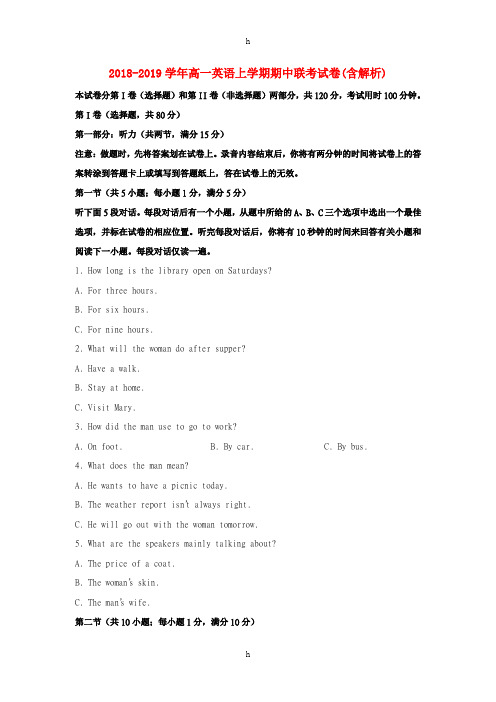
2018-2019学年高一英语上学期期中联考试卷(含解析)本试卷分第I卷(选择题)和第II卷(非选择题)两部分,共120分,考试用时100分钟。
第I卷(选择题,共80分)第一部分:听力(共两节,满分15分)注意:做题时,先将答案划在试卷上。
录音内容结束后,你将有两分钟的时间将试卷上的答案转涂到答题卡上或填写到答题纸上,答在试卷上的无效。
第一节(共5小题;每小题1分,满分5分)听下面5段对话。
每段对话后有一个小题,从题中所给的A、B、C三个选项中选出一个最佳选项,并标在试卷的相应位置。
听完每段对话后,你将有10秒钟的时间来回答有关小题和阅读下一小题。
每段对话仅读一遍。
1. How long is the library open on Saturdays?A. For three hours.B. For six hours.C. For nine hours.2. What will the woman do after supper?A. Have a walk.B. Stay at home.C. Visit Mary.3. How did the man use to go to work?A. On foot.B. By car.C. By bus.4. What does the man mean?A. He wants to have a picnic today.B. The weather report isn’t always right.C. He will go out with the woman tomorrow.5. What are the speakers mainly talking about?A. The price of a coat.B. The woman’s skin.C. The man’s wife.第二节(共10小题;每小题1分,满分10分)听下面几段材料。
2018-2019学年高一英语上学期期中试卷(含解析) (I)
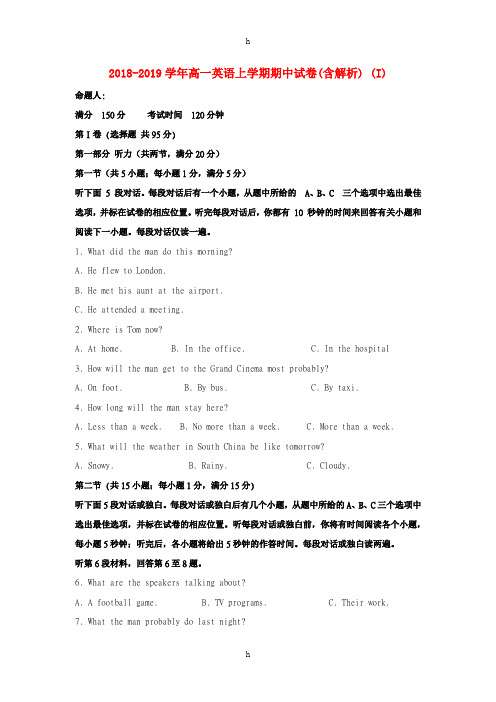
2018-2019学年高一英语上学期期中试卷(含解析) (I)命题人:满分 150分考试时间 120分钟第I卷 (选择题共95分)第一部分听力(共两节,满分20分)第一节(共5小题;每小题1分,满分5分)听下面 5 段对话。
每段对话后有一个小题,从题中所给的 A、B、C 三个选项中选出最佳选项,并标在试卷的相应位置。
听完每段对话后,你都有 10 秒钟的时间来回答有关小题和阅读下一小题。
每段对话仅读一遍。
1. What did the man do this morning?A. He flew to London.B. He met his aunt at the airport.C. He attended a meeting.2. Where is Tom now?A. At home.B. In the office.C. In the hospital3. How will the man get to the Grand Cinema most probably?A. On foot.B. By bus.C. By taxi.4. How long will the man stay here?A. Less than a week.B. No more than a week.C. More than a week.5. What will the weather in South China be like tomorrow?A. Snowy.B. Rainy.C. Cloudy.第二节 (共15小题;每小题1分,满分15分)听下面5段对话或独白。
每段对话或独白后有几个小题,从题中所给的A、B、C三个选项中选出最佳选项,并标在试卷的相应位置。
听每段对话或独白前,你将有时间阅读各个小题,每小题5秒钟;听完后,各小题将给出5秒钟的作答时间。
每段对话或独白读两遍。
听第6段材料,回答第6至8题。
学2018-2019学年高一英语上学期期中试题_1
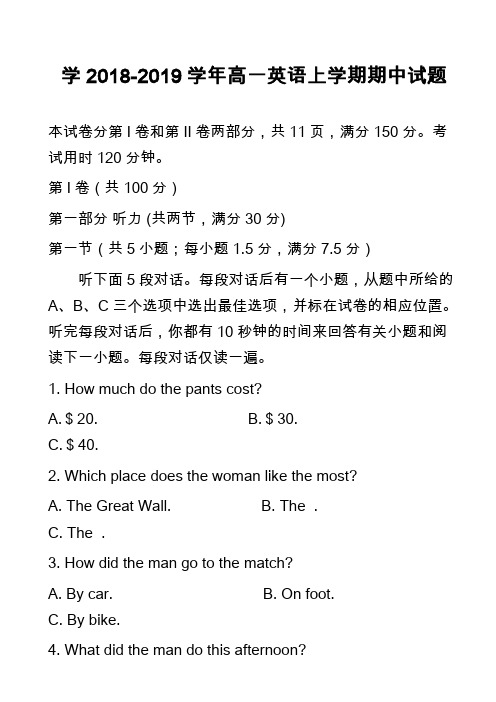
学2018-2019学年高一英语上学期期中试题本试卷分第I卷和第II卷两部分,共11页,满分150分。
考试用时120分钟。
第I卷(共100分)第一部分听力 (共两节,满分30分)第一节(共5小题;每小题1.5分,满分7.5分)听下面5段对话。
每段对话后有一个小题,从题中所给的A、B、C三个选项中选出最佳选项,并标在试卷的相应位置。
听完每段对话后,你都有10秒钟的时间来回答有关小题和阅读下一小题。
每段对话仅读一遍。
1. How much do the pants cost?A.$20.B.$30.C.$40.2. Which place does the woman like the most?A. The Great Wall.B. The .C. The .3. How did the man go to the match?A. By car.B. On foot.C. By bike.4. What did the man do this afternoon?A. He visited Susan.B. He watched a movie.C. He did his homework.5. Where are the speakers?A. At a restaurant.B. At a flower shop.C. At a concert.第二节(共15小题;每小题1.5分,满分22.5分)听下面5段对话或独白。
每段对话或独白后有几个小题,从题中所给的A、B、C三个选项中选出最佳选项,并标在试卷的相应位置。
听每段对话或独白前,你将有时间阅读各个小题,每小题5秒钟;听完后,各小题将给出5秒钟的作答时间。
每段对话或独白读两遍。
听下面一段对话,回答第6、7题。
6. When does Jack have a ping-pong lesson?A. On Tuesday.B. On Wednesday.C. On Thursday.7. What does Jack first do when he gets home?A. He has dinner.B. He watches TV.C. He works on his studies.听下面一段对话,回答第8、9题。
2018-2019学年高一英语上学期期中试题_2

2018-2019学年高一英语上学期期中试题第 I 卷(共 100 分)第一部分:听力(共两节,满分 30 分)第一节(共 5 小题;每小题 1.5 分,满分 7.5 分)听下面 5 段对话。
每段对话后有一个小题,从题中所给的 A、B、C 三个选项中选出最佳选项,并标在试卷的相应位置。
听完每段对话后,你都有 10 秒钟的时间来回答有关小题和阅读下一小题。
每段对话仅读一遍。
1. What kind of pet does the woman suggest?A. A dog.B. A fish.C. A cat.2. Which place is the woman looking for?A. A grocery store.B. A movie theater.C. The railway station.3. What did the man buy for the woman’s birthday?A. A fruit cake.B. Some apple pies.C. A bunch of flowers.4. What is the relationship between the speakers?A. Classmates.B. Parent and child.C. Teacher and student.5. Where is the woman?A. In a car.B. In a lift.C. In a bookstore.第二节(共 15 小题;每小题 1.5 分,满分 7.5 分)听下面 5 段对话或独白。
每段对话或独白后有 2 至 4 个小题,从题中所给的 A、B、C 三个选项中选出最佳选项,并标在试卷的相应位置。
听每段对话或独白前,你将有 5 秒钟的时间阅读各个小题;听完后,各小题将给出 5 秒钟的作答时间。
每段对话或独白读两遍。
听第 6 段材料,回答第 6 至 7 题。
2018至2019高一上学期英语期中试卷与答案
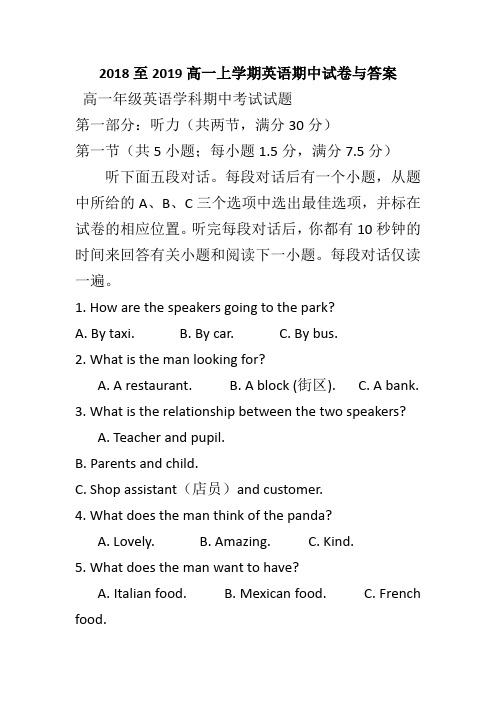
2018至2019高一上学期英语期中试卷与答案高一年级英语学科期中考试试题第一部分:听力(共两节,满分30分)第一节(共5小题;每小题1.5分,满分7.5分)听下面五段对话。
每段对话后有一个小题,从题中所给的A、B、C三个选项中选出最佳选项,并标在试卷的相应位置。
听完每段对话后,你都有10秒钟的时间来回答有关小题和阅读下一小题。
每段对话仅读一遍。
1. How are the speakers going to the park?A. By taxi.B. By car.C. By bus.2. What is the man looking for?A. A restaurant.B. A block (街区).C. A bank.3. What is the relationship between the two speakers?A. Teacher and pupil.B. Parents and child.C. Shop assistant(店员)and customer.4. What does the man think of the panda?A. Lovely.B. Amazing.C. Kind.5. What does the man want to have?A. Italian food.B. Mexican food.C. French food.第二节(共15题;每小题1.5分,满分22.5分)听下面五段对话或独白。
每段对话或独白后有几个小题,从题中所给的A、B、C三个选项中选出最佳选项,并标在试卷的相应位置。
听每段对话或独白前,你将有时间阅读各个小题,每小题5秒钟;听完后,各小题将给出5秒钟的作答时间。
每段对话或独白读两遍。
听第6段材料,回答第6至7题。
6. What has happened to the clock?A. Sold.B. Sent to the watchmaker’s.C. Stopped working.7. What does the woman think of the man?A. He can’t mend the clock.B. He had better mend the clock.C. He should have the clock repaired.听第7段材料,回答第8至10题。
精选2018-2019高一英语上学期期中联考试题与答案

精选2018-2019高一英语上学期期中联考试题与答案(时量:120分钟分值:150)第一部分:听力(共两节,满分30分)做题时,先将答案划在试卷上。
录音内容结束后,你将有两分钟的时间将试卷上的答案转涂到答题卡上。
第一节(共5小题;每小题1.5分,满分7.5分)听下面5段对话。
每段对话后有一个小题,从题中所给的A、B、C三个选项中选出最佳选项,并标在试卷的相应位置。
听完每段对话后,你都有10秒钟的时间来回答有关小题和阅读下一小题。
每段对话仅读一遍。
1.What does the woman want to do?A. To have an X ray.B. To go to the hospital.C. To help the wounded man.2.Where and when will the meeting be held?A. Room 303,3:00 pm.B. Room 303,2:00 pm.C. Room 302,2:00 pm.3.When would Thomas and Lily like to leave?A. Tomorrow.B. Next Monday or Tuesday.C. This Monday.[来4.What is the man's choice?A. He prefers train for trip.B. He doesn't liketraveling. C. Not mentioned.5.According to the woman, what should the man do at first?[A. He should ask about the flat on the phone.B. He should read the advertisements for flats in the newspaper.C. He should phone and make an appointment.第二节(共15小题;每小题1.5分,满分22.5分)听下面5段对话或独白。
2018—2019学年度上学期高一期中考试英语试卷
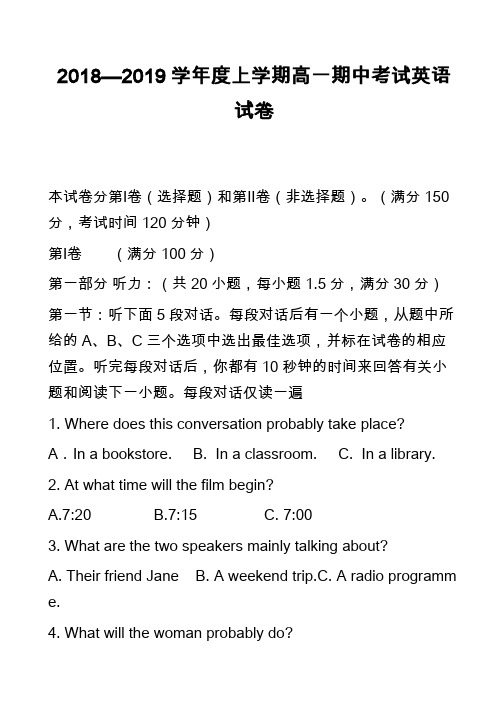
2018—2019学年度上学期高一期中考试英语试卷本试卷分第Ⅰ卷(选择题)和第Ⅱ卷(非选择题)。
(满分150分,考试时间120分钟)第Ⅰ卷(满分100分)第一部分听力:(共20小题,每小题1.5分,满分30分)第一节:听下面5段对话。
每段对话后有一个小题,从题中所给的A、B、C三个选项中选出最佳选项,并标在试卷的相应位置。
听完每段对话后,你都有10秒钟的时间来回答有关小题和阅读下一小题。
每段对话仅读一遍1. Where does this conversation probably take place?A.In a bookstore. B. In a classroom. C. In a library.2. At what time will the film begin?A.7:20B.7:15C. 7:003. What are the two speakers mainly talking about?A. Their friend JaneB. A weekend trip.C. A radio programm e.4. What will the woman probably do?A. Catch a train.B. See the man off.C. Go shopping.5. Why did the woman apologize?A. She made a late delivery.B. She went to the wrong place .C. She couldn't take the cake back.第二节(共15小题:每小题1.5分,满分22.5分)听下面5段对话。
每段对话后有几个小题,从题中所给的A、B、C三个选项中选出最佳选项,并标在试卷的相应位置。
听每段对话前,你将有时间阅读各个小题,每小题5秒钟:听完后,各小题给出5秒钟的做答时间。
2018-2019学年高一英语上学期期中试题(含解析)
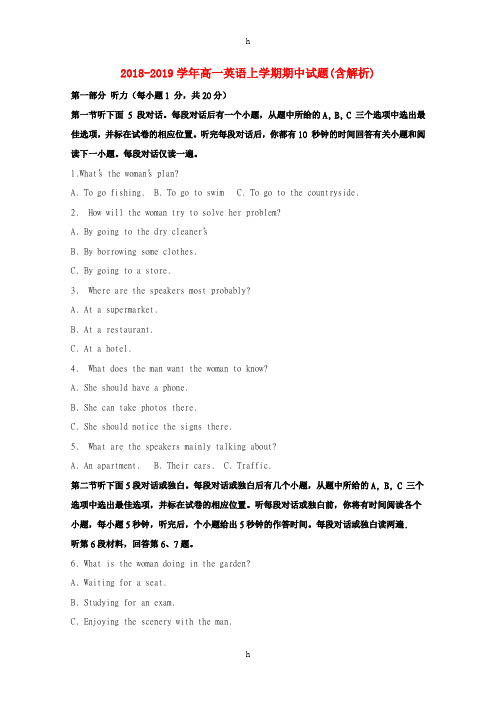
2018-2019学年高一英语上学期期中试题(含解析)第一部分听力(每小题1 分,共20分)第一节听下面 5 段对话。
每段对话后有一个小题,从题中所给的A, B, C 三个选项中选出最佳选项,并标在试卷的相应位置。
听完每段对话后,你都有10 秒钟的时间回答有关小题和阅读下一小题。
每段对话仅读一遍。
1.What’s the woman’s plan?A. To go fishing.B. To go to swimC. To go to the countryside.2. How will the woman try to solve her problem?A. By going to the dry cleaner’sB. By borrowing some clothes.C. By going to a store.3. Where are the speakers most probably?A. At a supermarket.B. At a restaurant.C. At a hotel.4. What does the man want the woman to know?A. She should have a phone.B. She can take photos there.C. She should notice the signs there.5. What are the speakers mainly talking about?A. An apartment.B. Their cars.C. Traffic.第二节听下面5段对话或独白。
每段对话或独白后有几个小题,从题中所给的A, B, C 三个选项中选出最佳选项,并标在试卷的相应位置。
听每段对话或独白前,你将有时间阅读各个小题,每小题5秒钟,听完后,个小题给出5秒钟的作答时间。
每段对话或独白读两遍.听第6段材料,回答第6、7题。
)2018-2019学年高一上学期英语期中联考试卷

)2018-2019学年高一上学期英语期中联考试卷一、阅读理解1. 阅读理解Make Money This Summer with Sunny Libraries!Do you have too much free time this summer vacation? Do you need a summer job to earn extra money? Do you want to be involved in your community? Sunny Area Library System (SALS) has job opportunities for high school students. These are good chances to get work experience.1.(1) How much can you earn if you work as ComputerTutor for one week?A . $64.B . $120.C . $320.D . $140.2.(2) What are you expected to do if you get the job of"Reader Desk"?A . To repair computers.B . To lift heavy boxes.C . To work with young children.D . To check materials for guests.3.(3) What's the main purpose of the aboveadvertisement?A . To attract students to libraries.B . To raise money forlibraries. C . To introduce new books. D . To provide job opportunities.2. 阅读理解What's the meaning of "dark horse"? It's someone who wins when no one expects it.Han Xiaopeng took China's first gold on snow. He became an Olympic "dark horse" by winning the gold medal in men's freestyle aerial skiing(自由式滑雪空中技巧) at Turin in Italy. He made two almost perfect jumps for the highest score. Han had never won a world gold medal before, let alone(更不用说) in the Olympics!"I never thought this would happen," said the 23-year-old. "I feel like I'm in a dream." It's China's second gold medal at the Turin Olympics. But more important, Han's gold was the country's first ever in a snow sport. In 2002, China's Yang Yang won the gold for speed skating at the winter Olympics in Salt Lake City, US.That Han's win was unexpected doesn't mean that he didn't work hard.Han grew up in Jiangsu Province. Before he started his training on snow, he used to be an acrobat(杂技演员) at a circus. In 1995, a coach found his talent(才能). The coach, Yang Er'qi, said Han had the agility(灵活性) and courage to be a ski jumper. When Yang first took the 12-year-old to northernChina, the boy couldn't swim, skate or ski. But he wasn't afraid of the high platform(跳台) and kept on training.Han almost left the sport after hurting his knee months before the Salt Lake Games. In that Olympics he only got 24th. "I was hopeless at that time, but my family and the coach stoodfirmly(坚强地) behind me, helping me through," he recalled.Han Xiaopeng worked so hard that he won the gold medal in the Olympics at last. Because of his success, more and more people in China are becoming interested in skiing. We are proud of him and we hope he will have another big success in the next winter Olympics.1.(1) What does "dark horse" mean?A . A horse which is dark.B . A someone who is unexpected to win.C . A horse which likes the dark.D . A someone whose win is expected.2.(2) Where did Han Xiaopeng take China's first gold onsnow?A . In China.B . In Italy.C . In America.D . In Australia.3.(3) What made the coach, Yang Er'qi, choose HanXiaopeng to be a ski jumper?A . He had enough courage though he was only 12 years old.B . He was born in the south of China and liked sports on snow.C . He had the agility and wasn't afraid of the high platform.D .He had the talent and he had won a world gold medal before.4.(4) What is the best title for this passage?A . A Wonderful Match.B . A Dark Horse at the Winter Olympics.C . A Hopeful Snow Game.D . An Exciting Skiing Race.3. 阅读理解Having friends may well keep you healthier and help you deal with stress better. Some studies show that people with close friends have a greater ability to fight disease than people who are alone.Place friendship in the first place. Find the time to be with friends even if it means letting the lawn(草坪) go unmowed (未割的) or the dishes unwashed for a while. When you can't get together, use the phone to keep in touch.Open up to close friends. Keeping a deep friendship requires a level of “heartfelt” intimacy (亲密).Don't be afraid to express your inner fears and disappointments. Listen to your friends when they have problems, but offer advice only when it's wanted. Help raise friends' self-esteem(自尊) when they are sad about a job loss, or other such events.Have different friends for different activities, such as going to the movies, singing in a choir, and joining in a bowling league.Don't wait for a friend to ask for helps. When a friend has the flu, offer to go to the store or drive his or her children to their afterschool activities.Never take a friendship for granted. Like a good marriage,friendship needs care and patience. Become a joiner. Find a group that matches your interests.Talk to strangers. Conversations started in museums, laundry rooms, or bookstores can lead to firm friendship.Enroll in an adult education course. A classroom is an ideal place to meet others with similar interests.1.(1) People who are alone have a ability to fightdisease than people with close friends.A . more.B . greater.C . poorer.D . little.2.(2) According to the passage, when had you better offeradvice to your friends?A . At any moment.B . Only when they are happy.C . Only when they want it.D . Only when you are glad.3.(3) What does the underlined word "Enroll" in the lastparagraph mean?A . Give.B . Join.C . Get.D . Catch.4.(4) Which of the statements is TRUE according to thepassage?A . You should have different friends for the same activities.B .You should wait for a friend to ask a favor. C . You should take a friendship for granted. D . You should talk with strangers in museums, laundry rooms, or bookstores in order to improve friendship.4. 阅读理解Everybody hates rats (big mice). But in the earthquake capitals of the world — Japan, Los Angeles, Turkey — rats will soon be man's best friends.What happens after an earthquake? We send in rescue dogs. Why? Because they can smell people. Dogs save lives. They help rescuers to find living people. But dogs are big and they can't get into small spaces. So now a new research project is using a smaller animal to save lives: the rat.How does it work? First, the rat is trained to smell people. When this happens, the rat's brain gives a signal (信号).This is sent to a small radio on its back, and then the rescuers follow the radio signals. When the rat's brain activity jumps, the rescuers know that someone is alive. The rat has smelled that person.Although there are already robots which can do this job, rats are better. Christian Linster at Cornell University, New York, says, "Robots' noses don't work well when there are other smells around. Rats are good at that." Rats can also see in thedark. They are cheaper and quicker to train than dogs, and unlike robots, they don't need electricity!The "rat project" is not finished, but Julie Ryan of International Rescue Organization in Scotland says, "It would be wonderful. A rat could get into spaces we couldn't get to, and a rat would get out if it wasn't safe." Perhaps for the first time in history, people will be happy to see a rat in a building (but only after an earthquake, of course).1.(1) Why will rats become man's best friends in the worldearthquake capitals?A . Because they can take the place of man's rescue jobs.B . Because they can find the position of people alive who are trapped in buildings.C . Because they can serve as food for people alive who are trapped in buildings.D . Because they can get into small spaces.2.(2) From the third paragraph we know the rescuers canjudge a person who is alive by _____.A . the noise made by the rat.B . the rat's unusual behavior.C . the signal sent by the radio on the rat's back.D . the smell given off by the person.3.(3) Which of these statements is NOT the advantage thatrats have?A . They are more lovely than other animals.B . They are lessexpensive to train than dogs. C . They don't need electricity. D . They are small and can get into small places.4.(4) What can we infer from the passage?A . At present rats have taken the place of dogs in searching for people.B . The "rat project" has been completed.C . People are now happy to see a rat in a building.D . Now people still use dogs and robots in performing rescues.二、任务型阅读5. 根据短文内容,从短文后的选项中选出能填入空白处的最佳选项。
2018-2019学年贵州省铜仁市第一中学高一上学期期中英语试题Word版含听力
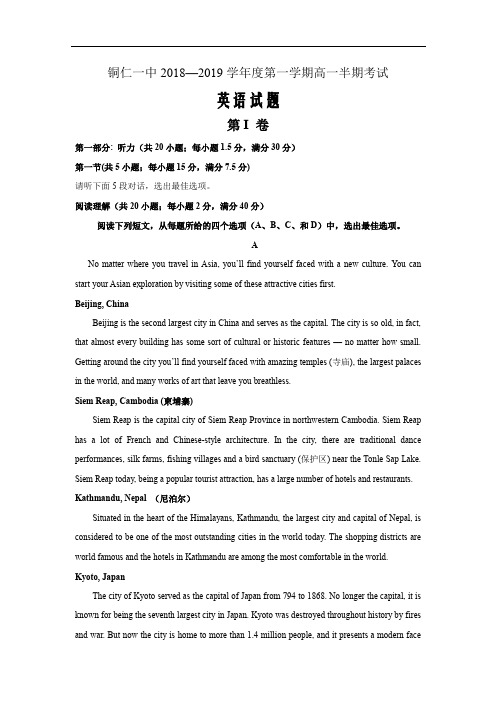
铜仁一中2018—2019学年度第一学期高一半期考试英语试题第I 卷第一部分: 听力(共20小题;每小题1.5分,满分30分)第一节(共5小题;每小题15分,满分7.5分)请听下面5段对话,选出最佳选项。
阅读理解(共20小题;每小题2分,满分40分)阅读下列短文,从每题所给的四个选项(A、B、C、和D)中,选出最佳选项。
ANo matter where you travel in Asia, you’ll find yourself faced with a new culture. You can start your Asian exploration by visiting some of these attractive cities first.Beijing, ChinaBeijing is the second largest city in China and serves as the capital. The city is so old, in fact, that almost every building has some sort of cultural or historic features — no matter how small. Getting around the city you’ll find yourself faced with amazing temples (寺庙), the largest palaces in the world, and many works of art that leave you breathless.Siem Reap, Cambodia (柬埔寨)Siem Reap is the capital city of Siem Reap Province in northwestern Cambodia. Siem Reap has a lot of French and Chinese-style architecture. In the city, there are traditional dance performances, silk farms, fishing villages and a bird sanctuary (保护区) near the Tonle Sap Lake. Siem Reap today, being a popular tourist attraction, has a large number of hotels and restaurants. Kathmandu, Nepal (尼泊尔)Situated in the heart of the Himalayans, Kathmandu, the largest city and capital of Nepal, is considered to be one of the most outstanding cities in the world today. The shopping districts are world famous and the hotels in Kathmandu are among the most comfortable in the world. Kyoto, JapanThe city of Kyoto served as the capital of Japan from 794 to 1868. No longer the capital, it is known for being the seventh largest city in Japan. Kyoto was destroyed throughout history by fires and war. But now the city is home to more than 1.4 million people, and it presents a modern faceto the rest of the world.Every city throughout Asia has a st ory of its own. It’s up to you to explore them all and find out exactly what each one has to offer. Enjoy!21. In Siem Reap you can see the following EXCEPT _____.A. Chinese-style buildingsB. excellent art worksC. traditional dancesD. a protected bird area22. If you want to visit the old palace, which city should you go?.A. Siem ReapB. KyotoC. KathmanduD. Beijing23. The writer’s purpose in writing the passage is _____.A. to introduce several attractive cities in AsiaB. to compare some tourist cities in AsiaC. to tell readers not to visit European citiesD. to write an advertisement about a travel companyB“How are you?” is a nice question. It's a friendly way that people in the United States greet each other. B ut “How are you?” is also an unusual question. It's a question that often doesn't need an answer. The person who asks “How are you?” expects to hear the answer“Fine”, even if the person isn’t fine. The reason is that “ How are you?” isn't really a question and “Fine” isn't really an answer. They are common ways of saying “Hello” or “Hi”.Sometimes, people don't say exactly what they mean. For example, when someone asks "Do you agree? " the other person may be thinking, "No, I don't. I think you are wrong.” It isn't polite to disagree very strongly, then he might say, "I am not so sure. "This is a nicer way to say that you don’t agree with someone.People also don't say exactly what they are thinking when they finish talking to other people. For example, many conversations over the phone end when one person says, I've got to go now.” or the person who wants to hang up will give an excuse, such as "Someone is at the door. " or“ Something is burning on the stove(火炉).” The excuse may be real, or not. The person w ho wants to hang up simply doesn't want to talk any more, but it isn't polite to say so. An excuse is polite, and it doesn't hurt the other person's feelings.Whether they are greeting each other, talking about an opinion, or ending a conversation,people often don’t say exactly what they are thinking. It's an important way that people try to be nice to each other, and it's part of the game of language.24. The passage is mainly about ______.A. how to make friends with peopleB. some polite questions used to greet another personC. important ways of being polite to other peopleD. how to end a conversation25. If you have different opinions from someone, it is polite to say “______”.A. You’re wrong.B. I’m not sure.C. Of course, I disagree. D No, I don't agree with you.26. Which of the following is polite way to finish a conversation?A. I have no time to talk to you now.B. I want to stop talking now.C. I have to go now.D. I don’t want to talk any more.27. According to the passage, when a person says "Something is burning on the stove. ", it meansthat ______.A. he is going to another placeB. he is hurting someone's feelingsC. he is talking to a person at the doorD. he is giving an excuseCLetter ADear Rose,I like your programs(节目) very much. I’m now writing to ask you something about American social customs. My American friends want me to join them in their dinner party. I am very happy and have decided to go, but I’m a little worried about it, too.The social customs in my country are very different from here, so I’m afraid of making mistakes.Should I bring a present, such as sweets or flowers? Should I arrived on time or a little late? At the dinner table, how can I know which fork or knife to use? How can I let the family know that I’m thankful for their kindness?Wang LinLetter BDear Wang Lin,It’s a good idea to bring a small present when you go to a dinner party. F lowers are always nice, or you may bring a bottle of wine if you know that your friend drink it.You should arrive on time or five to ten minutes late. Don’t get there early. If you are going to be more than fifteen minutes late, you should call and tell them.Try to be free at the dinner table. If you don’t know about choosing the right fork or knife, just watch the other people, and follow them. If you still have no idea of what to do, ask the person next to you.If you like the food, say so. Of course, y ou’ll thank them for the meal and for their kindness. It’s also a good idea to send a thank-you card the day after.Rose28. Wang Lin wants to _______.A. make friends with RoseB. know some social customs for a dinner partyC. make her friends happy C. give her friends a surprise29. Rose is most possibly _______.A. a good housewifeB. a member of the dinner partyC. a TV hostessD. a friend of Wang Lin’s30. If you’re asked to a dinner party but not sure about what to bring as a present, it’s good tobring _______.A. some fruitB. a bottle of wineC. some flowersD. a knife and fork31. Which of the following is NOT good for joining in a dinner party?A. Get there 15 minutes earlierB. Make yourself at homeC. Follow others to use forks and knivesD. Thank your friends for the mealDSamuel Osmond is a 19-year-old student from Cornwall, England. He studied the piano. However, he can play very difficult musical pieces by musicians such as Chopin and Beethoven just a few minutes after he hears them. He learns a piece of music by listening to it in parts. Then he thinks about the notes in his head. Two years ago, he played his first piece MoonlightSonata(奏鸣曲)by Beethoven. He surprised everyone around him.Amazed that he remembered this long and difficult piece of music and played it perfectly, his teachers say Samuel is unbelievable. They say his ability is very rare, but S amuel doesn’t even realize that what he can do is special. Samuel wanted to become a lawyer as it was the wish of his parents, but music teachers told him he should study music instead. Now, he studies law and music.Samuel can't understand why everyone is so surprised. “I grew up with music. My mother played the piano and my father played the guitar. About two years ago, I suddenly decided to start playing the piano, without being able to read music and without having any lessons. It comes easily to me---I hear the notes and can bear them in mind---each and every note,” says Samuel.Recently, Samuel performed a piece during a special event at his college. The piece had more than a thousand notes. The audience was impressed by his amazing performance. He is now learning a piece that is so difficult that many professional pianists can't play it. Samuel says confidently, "It's all about super memory---I guess I have that gift.”However, Samuel's ability to remember things doesn't stop with music. His family says that even when he was a young boy, Samuel heard someone read a story, and then he could retell the story word for word.Samuel is still only a teenager. He doesn't know what he wants to do in the future. For now, he is just happy to play beautiful music and continue his studies.32. What is special about Samuel Osmond?A. He has a gift for writing music.B. He can write down the note he hears.C. He is a top student at the law school.D. He can play the musical piece he hears.33. Everyone around Samuel was surprised because he ______.A. received a good early education in musicB. played the guitar and the piano perfectlyC could play the piano without reading musicD. could play the guitar better than his father34. What can we infer about Samuel in Paragraph 4?A. He became famous during a special event at his college.B. He is proud of his ability to remember things accurately.C. He plays the piano better than many professional pianists.D. He impressed the audience by playing all the musical pieces.35. Which of the following is the best title of this passage?A. The Story of a Musical TalentB. The Qualities of a MusicianC. The Importance of Early EducationD. The Relationship Between Memory and Music第二节(共5小题;每小题2分,满分10分)根据短文内容,从短文后的选项中选出能填入空白处的最佳选项。
最新2018-2019学年高一英语上学期期中试题
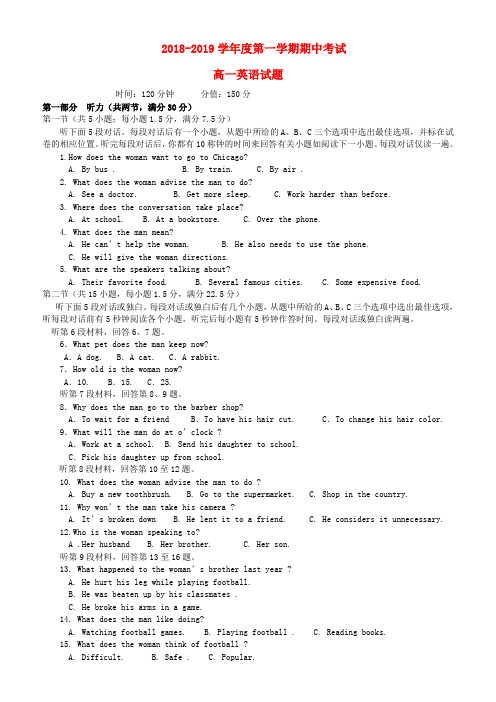
2018-2019学年度第一学期期中考试高一英语试题时间:120分钟分值:150分第一部分听力(共两节,满分30分)第一节(共5小题;每小题1.5分,满分7.5分)听下面5段对话。
每段对话后有一个小题,从题中所给的A、B、C三个选项中选出最佳选项,并标在试卷的相应位置。
听完每段对话后,你都有10称钟的时间来回答有关小题如阅读下一小题。
每段对话仅读一遍。
1.How does the woman want to go to Chicago?A. By bus .B. By train.C. By air .2. What does the woman advise the man to do?A. See a doctor.B. Get more sleep.C. Work harder than before.3. Where does the conversation take place?A. At school.B. At a bookstore.C. Over the phone.4. What does the man mean?A. He can’t help the woman.B. He also needs to use the phone.C. He will give the woman directions.5. What are the speakers talking about?A. Their favorite food.B. Several famous cities.C. Some expensive food.第二节(共15小题,每小题1.5分,满分22.5分)听下面5段对话或独白。
每段对话或独白后有几个小题,从题中所给的A、B、C三个选项中选出最佳选项,听每段对话前有5秒钟阅读各个小题,听完后每小题有5秒钟作答时间。
每段对话或独白读两遍。
听第6段材料,回答6、7题。
2018_2019学年高一英语上学期期中试题(17)word版本

高一年级上学期期中考试英语试题(2018-11-18)第一部分听力(共两节, 满分30分)第一节(共5小题; 每小题1. 5分, 满分7. 5分) 听下面5段对话,每段对话仅读一遍。
1. Where does the conversation happen?A. In a fruit shop.B. In a restaurant.C. In a supermarket.2. What’s wrong with Jack?A. He has a cough.B. He has a cold.C. He has a fever.3. What does the woman plan to do?A. Draw some pictures.B. Buy something on sale.C. Make an advertisement.4. Where are the speakers?A. At a hotel.B. At a store.C. At a clinic.5. What is the woman unsatisfied with?A. The acting.B. The special effects.C. The plot.第二节(共15小题; 每小题1. 5分, 满分22. 5分)听下面5段对话或独白,每段对话或独白读两遍。
听第6段材料, 回答第6、7题。
6. What will the man do on his birthday?A. Go out for a meal.B. Go to see a film.C. Work on his term’s work.7. What is the relationship between the speakers?A. Brother and sister.B. Classmates.C. Teacher and student.听第7段材料, 回答第8、9题。
贵州省铜仁市高一英语上学期期中试题(new)

2017-2018学年度第一学期高一半期考试英语试卷(本试题分为第I卷和第Ⅱ卷;满分:150分,考试时间:120分钟)第I卷第一部分听力(共两节,满分30分)第一节(共5小题;每小题1.5分,共7.5分)听下面5段对话。
每段对话后有一个小题,从题中所给的A、B、C三个选项中选出最佳选项,并标在试卷的相应位置。
听完每段对话后,你都有10秒钟的时间来回答有关小题和阅读下一小题.每段对话仅读一遍。
1. What is the probable relationship between the speakers?A。
Mother and son. B。
Teacher and student. C。
Wife and husband。
2. What are the speaker doing?A. Trying to get to the train。
B. Shopping for some bags. C。
Catching a taxi.3。
How is the girl going to school?A. By bicycle.B. By car。
C。
By air。
4。
Where is the tallest tree now?A。
In America。
B. In Africa。
C. In Australia。
5. When did the two speakers begin to wait there?A。
At about 5:45. B. At about 6:15。
C。
At about 5:35。
第二节(共15小题;每小题1。
5分,满分22。
5分)听下面5段对话或独白。
每段对话或独白后有几个小题,从题中所给的A、B、C三个选项中选出最佳选项,并标在试卷的相应位置。
听每段对话或独白前,你将有时间阅读各个小题,每小题5秒钟;听完后,各小题将给出5秒钟的作答时间。
每段对话或独白读两遍。
2020【新版上市】贵州省铜仁伟才学校高一英语第一学期期中试题(无答案)
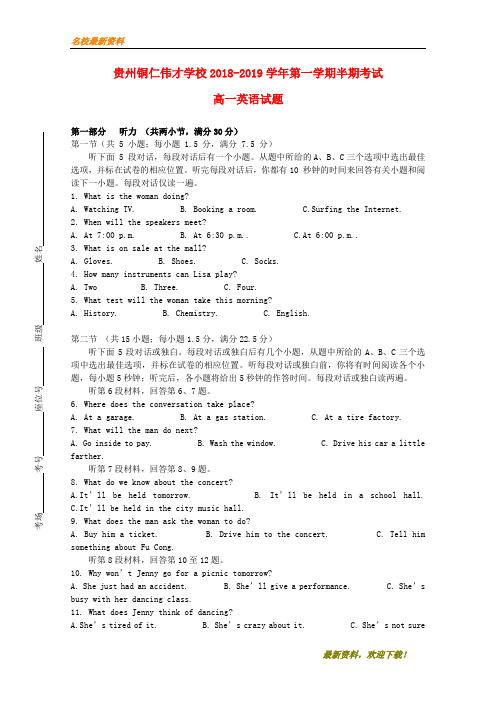
高一英语试题第一部分听力(共两小节,满分30分)第一节(共 5 小题;每小题 1.5 分,满分 7.5 分)听下面 5 段对话,每段对话后有一个小题。
从题中所给的A、B、C三个选项中选出最佳选项,并标在试卷的相应位置。
听完每段对话后,你都有10 秒钟的时间来回答有关小题和阅读下一小题。
每段对话仅读一遍。
1. What is the woman doing?A. Watching TV.B. Booking a room.C.Surfing the Internet.2. When will the speakers meet?A. At 7:00 p.m.B. At 6:30 p.m..C.At 6:00 p.m..3. What is on sale at the mall?A. Gloves.B. Shoes.C. Socks.4. How many instruments can Lisa play?A. TwoB. Three.C. Four.5. What test will the woman take this morning?A. History.B. Chemistry.C. English.第二节(共15小题;每小题1.5分,满分22.5分)听下面5段对话或独白。
每段对话或独白后有几个小题,从题中所给的A、B、C三个选项中选出最佳选项,并标在试卷的相应位置。
听每段对话或独白前,你将有时间阅读各个小题,每小题5秒钟;听完后,各小题将给出5秒钟的作答时间。
每段对话或独白读两遍。
听第6段材料,回答第6、7题。
6. Where does the conversation take place?A. At a garage.B. At a gas station.C. At a tire factory.7. What will the man do next?A. Go inside to pay.B. Wash the window.C. Drive his car a little farther.听第7段材料,回答第8、9题。
- 1、下载文档前请自行甄别文档内容的完整性,平台不提供额外的编辑、内容补充、找答案等附加服务。
- 2、"仅部分预览"的文档,不可在线预览部分如存在完整性等问题,可反馈申请退款(可完整预览的文档不适用该条件!)。
- 3、如文档侵犯您的权益,请联系客服反馈,我们会尽快为您处理(人工客服工作时间:9:00-18:30)。
铜仁一中2018—2019学年度第一学期高一半期考试英语试题第I 卷第一部分: 听力(共20小题;每小题1.5分,满分30分)第一节(共5小题;每小题15分,满分7.5分)请听下面5段对话,选出最佳选项。
1. What are the speakers doing?A. Seeing a doctor.B. Enjoying a concert.C. Buying some tickets.2. What will the man do next Thursday?A. Start his new job.B. Have an interview.C. Meet Professor Green.3. What is the woman's first lesson this morning?A. Science.B. Geography.C. Math.4. What day is it probably today?A. Monday.B. Wednesday.C. Friday.5. What kind of music does the woman like best?A. Country music.B. Rock music.C. Pop music.第二节(共15小题;每小题1.5分,满分22.5分)请听下面5段对话或独白,选出最佳选项。
请听第6段材料,回答第6、7题6. How old is the woman now?A. Eighteen years old.B. Ten years old.C. Eight years old.7. Where does the woman plan to go next year?A. To Canada.B. To America.C. To France.请听第7段材料,回答第8、9题。
8. How does the man feel when he sees the sandwiches?A. Disappointed.B. Excited.C. Annoyed.9. What will the man order?A. Steak.B. Seafood.C. Fried chicken.请听第8段材料,回答第10至12题10. What season is it now?A. Spring.B. Summer.C. Autumn.11. What does the man suggest the woman do?A. Rent a car.B. Sell her bike.C. Ride around the city.12. How much will the woman pay in total?A. 6.5 euros.B. 13 euros.C. 26 euros.请听第9段材料,回答第13至16题13. What is still in the woman’s garage?A. The metal desk.B. The computer.C. The CD player.14. Where is the sofa now?A. In the living room.B. In the dining room.C. In the bedroom.15. What does the woman like about the new flat?A. She has got a large mirror.B. She has new bookshelves.C. She has a bigger bedroom.16. What will the man do this evening?A. Visit the woman.B. Help move houseC. Celebrate his birthday.请听第10段材料,回答第17至20题。
17. When is the meeting held?A. On Thursday evening. B .On Sunday morning. C. On Sunday evening.18. When does the meeting finish?A. At 7.B.At9:30.C. At 10.19. Why do people need to pay f3 each week?A. To pay for heating.B. To pay for the hall.C. To pay for the TV.20. Why does the speaker make the phone call?A. To arrange a weekly meeting.B. To provide a sports program.C. To introduce a volleyball club.阅读理解(共20小题;每小题2分,满分40分)阅读下列短文,从每题所给的四个选项(A、B、C、和D)中,选出最佳选项。
ANo matter where you travel in Asia, you’ll find yourself faced with a new culture. You can start your Asian exploration by visiting some of these attractive cities first.Beijing, ChinaBeijing is the second largest city in China and serves as the capital. The city is so old, in fact, that almost every building has some sort of cultural or historic features —no matter how small. Getting around the city you’ll find yourself faced with amazing temples (寺庙), the largest palaces in the world, and many works of art that leave you breathless.Siem Reap, Cambodia (柬埔寨)Siem Reap is the capital city of Siem Reap Province in northwestern Cambodia. Siem Reap has a lot of French and Chinese-style architecture. In the city, there are traditional dance performances, silk farms, fishing villages and a bird sanctuary (保护区) near the Tonle Sap Lake. Siem Reap today, being a popular tourist attraction, has a large number of hotels and restaurants.Kathmandu, Nepal (尼泊尔)Situated in the heart of the Himalayans, Kathmandu, the largest city and capital of Nepal, is considered to be one of the most outstanding cities in the world today. The shopping districts are world famous and the hotels in Kathmandu are among the most comfortable in the world.Kyoto, JapanThe city of Kyoto served as the capital of Japan from 794 to 1868. No longer the capital, it is known for being the seventh largest city in Japan. Kyoto was destroyed throughout history by fires and war. But now the city is home to more than 1.4 million people, and it presents a modern face to the rest of the world.Every city throughout Asia has a story of its own. It’s up to you to explore them all and find out exactly what each one has to offer. Enjoy!21. In Siem Reap you can see the following EXCEPT _____.A. Chinese-style buildingsB. excellent art worksC. traditional dancesD. a protected bird area22. If you want to visit the old palace, which city should you go?.A. Siem ReapB. KyotoC. KathmanduD. Beijing23. The writer’s purpose in writing the passage is _____.A. to introduce several attractive cities in AsiaB. to compare some tourist cities in AsiaC. to tell readers not to visit European citiesD. to write an advertisement about a travel companyB“How are you?”is a nice question. It's a friendly way that people in the United States greet each other. But“How are you?” is also an unusual question. It's a question that often doesn't need an answer. The person who asks“How are you?”expects to hear the answer“Fine”, even if the person isn’t fine. The reason is that “ How are you?” isn'treally a question and “Fine” isn't really an answer. They are common ways of saying“He llo”or“H i”.Sometimes, people don't say exactly what they mean.For example, when someone asks "Do you agree? "the otherperson may be thinking,"No, I don't. I think you arewrong.”It isn't polite to disagree very strongly, then hemight say,"I am not so sure. "This is a nicer way to say thatyou don’t agree with so meone.People also don't say exactly what they are thinkingwhen they finish talking to other people. For example, manyconversations over the phone end when one person says, I've got to go now.” or the person who wants to hang upwill give an excuse, such as "Someone is at the door. "or“ Something is burning on the stove(火炉).” The excuse may be real, or not. The person who wants to hang upsimply doesn't want to talk any more, but it isn't polite tosay so. An excuse is polite, and it doesn't hurt the otherperson's feelings.Whether they are greeting each other, talking about anopinion, or ending a conversation, people often don’t sayexactly what they are thinking. It's an important way thatpeople try to be nice to each other, and it's part of the gameof language.24. The passage is mainly about ______.A. how to make friends with peopleB. some polite questions used to greet another personC. important ways of being polite to other peopleD. how to end a conversation25. If you have different opinions from someo ne, it is politeto say“______”.A. You’re wrong.B. I’m not sure.C. Of course, I disagree. D No, I don't agree with you.26. Which of the following is polite way to finish a conversation?A. I have no time to talk to you now.B. I want to stop talking now.C. I have to go now.D. I don’t want to talk any more.27. According to the passage, when a person says"Somethingis burning on the stove.",it means that ______.A. he is going to another placeB. he is hurting someone's feelingsC. he is talking to a person at the doorD. he is givingan excuseCLetter ADear Rose,I like your programs(节目) very much. I’m now writing to ask you something about American social customs. My American friends want me to join them in their dinner party. I am very happy and have decided to go, but I’m a little worried about it, too.The social customs in my country are very different from here, so I’m afraid of making mistakes.Should I bring a present, such as sweets or flowers? Should I arrived on time or a little late? At the dinner table, how can I know which fork or knife to use? How can I let the family know that I’m thankful for their kindness?Wang LinLetter BDear Wang Lin,It’s a good idea to bring a small present when you go to a dinner party. Flowers are always nice, or you may bring a bottle of wine if you know that your friend drink it.You should arrive on time or five to ten minutes late. Don’t get there early. If you are going to be more than fifteen minutes late, you should call and tell them.Try to be free at the dinner table. If you don’t know about choosing the right fork or knife, just watch the other people, and follow them. If you still have no idea of what to do, ask the person next to you.If you like the food, say so. Of course, you’ll thank them for the meal and for their kindness. It’s also a good idea to send a thank-you card the day after.Rose28. Wang Lin wants to _______.A. make friends with RoseB. know some social customs for a dinner partyC. make her friends happy C. give her friends a surprise29. Rose is most possibly _______.A. a good housewifeB. a member of the dinner partyC. a TV hostessD. a friend of Wa ng Lin’s30. If you’re asked to a dinner party but not sure about what to bring as a present,it’s good to bring _______.A. some fruitB. a bottle of wineC. some flowersD. a knife and fork31. Which of the following is NOT good for joining in a dinner party?A. Get there 15 minutes earlierB. Make yourself at homeC. Follow others to use forks and knivesD. Thank your friends for the mealDSamuel Osmond is a 19-year-old student fromCornwall, England. Hestudied the piano. However,hecan play very difficult musicalpieces by musicians such asChopin and Beethoven just a few minutes after he hears them. He learns a piece of music by listening to it in parts.Then he thinks about the notes in his head. Two years ago, he played his first piece Moonlight Sonata(奏鸣曲)by Beethoven. He surprised everyone around him.Amazed that he remembered this long and difficult pieceof music and played it perfectly, his teachers say Samuel isunbelievable. They say his ability is very rare, but Samueldoesn’t even realize that what he can do is special. Samuelwanted to become a lawyer as it was the wish of his parents, but music teachers told him he should study music instead.Now, he studies law and music.Samuel can't understand why ever yone is so surprised.“I grew up with music. My mother played the piano and myfather played the guitar. About two years ago, I suddenlydecided to start playing the piano, without being able to readmusic and without having any lessons. It comes easily tome---I hear the notes and can bear them in mind---each andevery note,” says Samuel.Recently, Samuel performed a piece during a specialevent at his college. The piece had more than a thousandnotes. The audience was impressed by his amazingperformance. He is now learning a piece that is so difficultthat many professional pianists can't play it. Samuel saysconfidently, "It's all about super memory---I guess I have that gift.”However, Samuel's ability to rememberthings doesn'tstop with music. His family says that even whenhe was ayoung boy, Samuel heard someone read a story, and then he could retell the story word for word.Samuel is still only a teenager. He doesn't know whathe wants to do in the future. For now, he is just happy toplay beautiful music and continue his studies.32. What is special about Samuel Osmond?A. He has a gift for writing music.B. He can write down the note he hears.C. He is a top student at the law school.D. He can play the musical piece he hears.33. Everyone around Samuel was surprised becausehe ______.A. received a good early education in musicB. played the guitar and the piano perfectlyC could play the piano without reading musicD. could play the guitar better than his father34. What can we infer about Samuel in Paragraph 4?A. He became famous during a special event at his college.B. He is proud of his ability to remember thingsaccurately.C. He plays the piano better than many professionalpianists.D. He impressed the audience by playing all the musicalpieces.35. Which of the following is the best title of this passage?A. The Story of a Musical TalentB. The Qualities of a MusicianC. The Importance of Early EducationD. The Relationship Between Memory and Music第二节(共5小题;每小题2分,满分10分)根据短文内容,从短文后的选项中选出能填入空白处的最佳选项。
